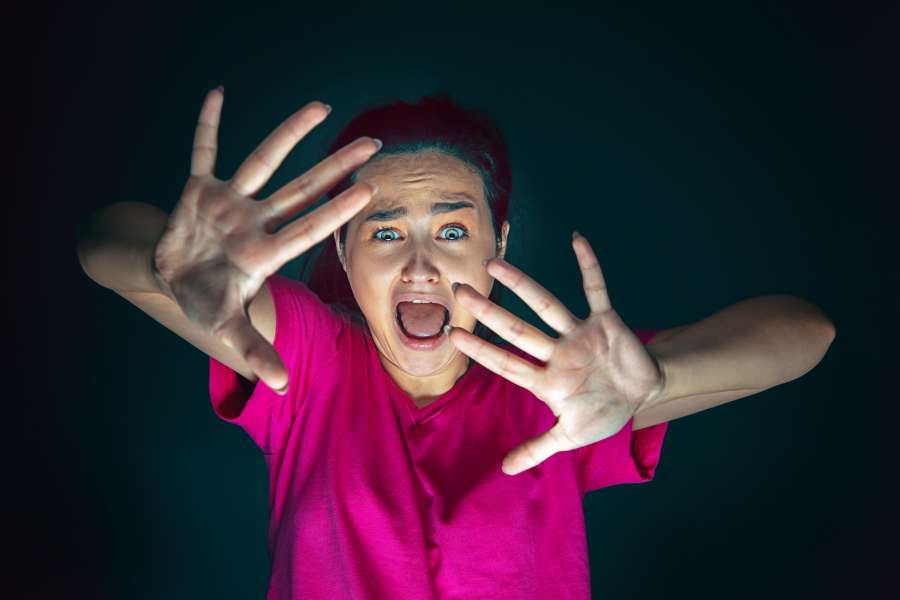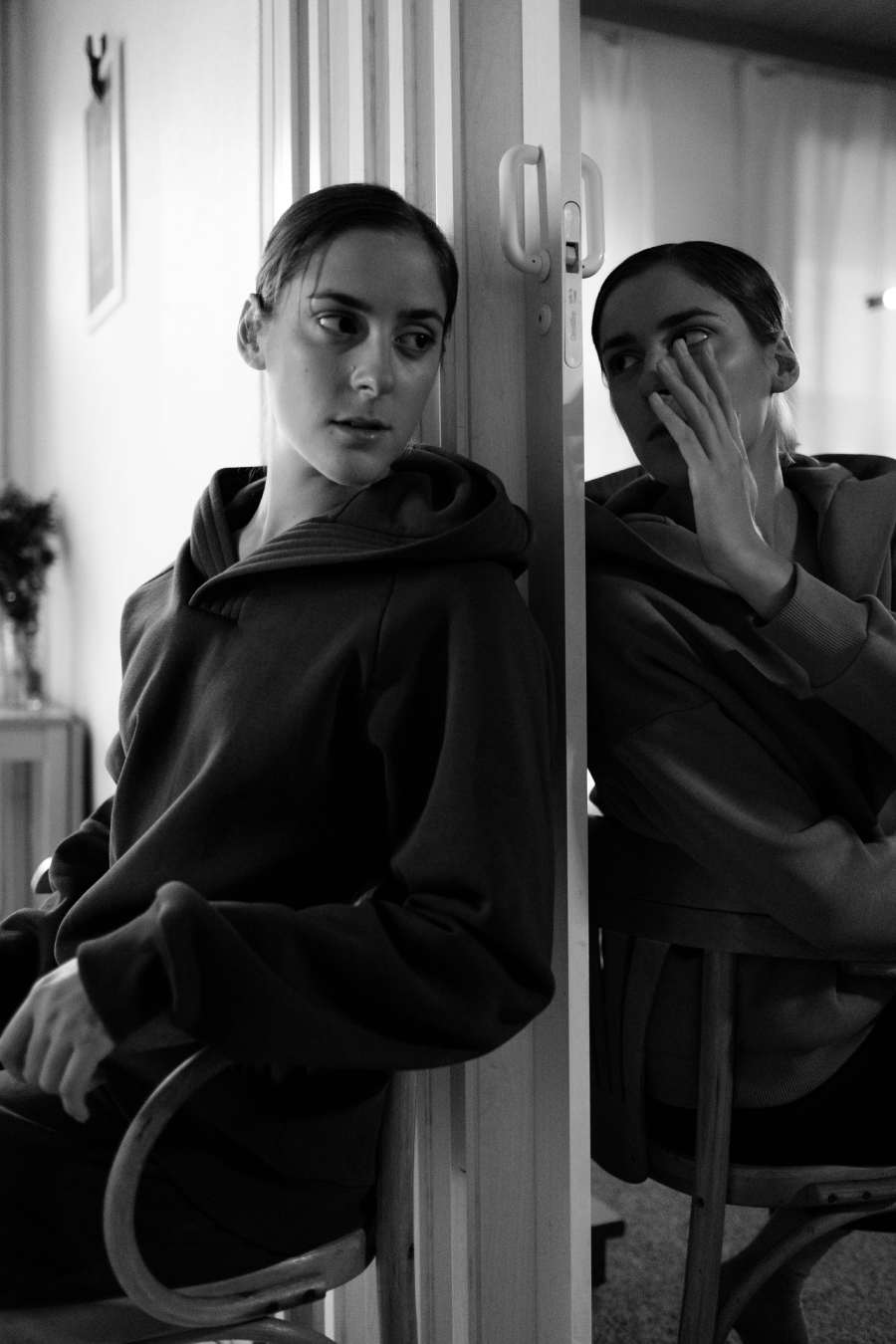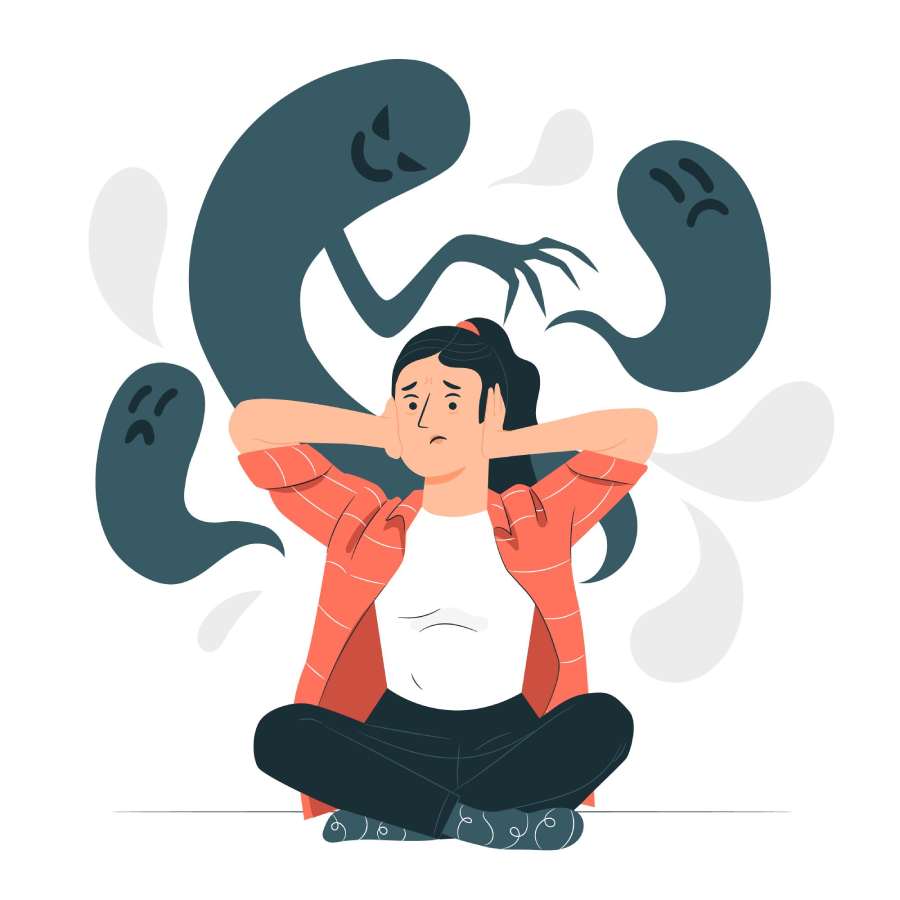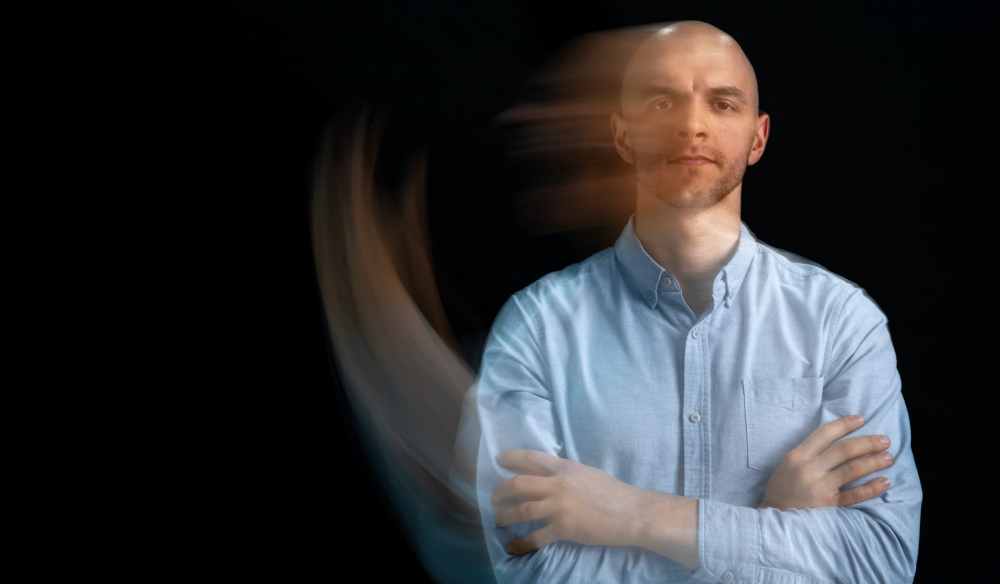Delusions and Hallucinations are two intriguing facets of the human mind, often hidden in mystery and misunderstanding. Even though they are different, they both affect how we perceive things. In this blog, we will try to have a deeper understanding of both concepts, learn about their types, talk about what causes them, and the treatment methods that are used.
Definitions
Delusions are persistent, unshakable beliefs that lack basis in reality. It is a fixed belief and firmly held despite clear contradictory evidence. The word Delusion comes from the Latin word “ludere” which means “to play”. It basically means the tricks played on the mind. A delusion involves a disturbance in the content and perception of thought. Not all people who have delusions are diagnosed with schizophrenia but however, delusions are a common symptom of Schizophrenia. Some prominent beliefs are that one’s thoughts and feelings/ actions are being controlled by some external things that private thoughts are being exposed to everybody or someone is manipulating the thoughts. (Hooley, Butcher, Nock & Mineka, 2017)
On the other hand, Hallucinations are false perceptions of objects or events involving the senses. They seem real to a person experiencing them but occur in the absence of any external perceptual stimulus. The word Hallucination is derived from the Latin verb “hallucinere” or “allucinere” which means “wander in mind” or “idle talk” For example, a person might hear sounds or voices when no one else is there in the room or see some creatures or insects which aren’t there or which don’t exist at all.(Hooley, Butcher, Nock & Mineka, 2017).
An important difference between delusions and Hallucinations is that Delusions are cognitions (thoughts) whereas hallucinations are where people can hear threatening voices or see things or people who aren’t present in the room. The key difference lies in the nature of distortion: delusions perturb beliefs and thoughts, while hallucinations distort sensory experiences. Both delusions and hallucinations are typically associated with psychiatric and neurological disorders and require professional assessment and care. (Gupta, 2022)

Types of Delusions
Persecutory Delusions
Persecutory delusions involve the false and irrational belief that a person or object is trying to hurt or work against you. Individuals experiencing these delusions often feel as though they are being spied on, plotted against, or that a vast conspiracy is directed at them, even in the absence of any evidence.
Erotomanic Delusions
Erotomanic delusions are an unwavering belief of obsessive love or an idea that someone famous or unknown is deeply in love with them. Individuals with these delusions may interpret benign gestures as proof of these imagined romantic connections. This delusion may lead to stalking or harmful intrusive behaviors among such individuals.
Grandiose Delusions
Grandiose delusions are when a person feels that, themselves, certain objects, or specific situations are crucially important, powerful, or valuable. They believe that they possess exceptional abilities, attributes, or a unique connection to influential figures or deities which in turn lead to extravagant behaviors.
Jealous Delusions
Jealous delusions involve unusual jealousy or possessiveness toward another person. It centers around the irrational belief that a partner is unfaithful. These delusions can be distressing for both the individual experiencing this and the partner.
Somatic Delusions
Somatic delusion revolves around bodily functions and is a false belief that the person has a physical issue or medical problem. These delusions can lead to excessive visits to healthcare professionals.
Mixed Delusions
Mixed Delusions happen when the person is affected with two or more themes. These individuals may hold multiple false beliefs simultaneously, making it challenging to classify their delusions into a single category. Such type of delusions are observed in complex psychiatric conditions like schizoaffective disorder. (Kiran & Chaudhary 2009)(Medicover Hospitals)

Types of Hallucinations
Auditory Hallucinations
Auditory Hallucinations involve perceiving sounds, voices, or noises that aren’t actually present in the environment. One might hear the voices talking to each other or feel that they’re telling you to do something.
Visual Hallucinations
Visual hallucinations consist of seeing things that don’t exist, such as people, objects, animals, or patterns. For example, seeing things that one doesn’t kike, or seeing things moving in a way they usually don’t.
Olfactory Hallucinations
Olfactory hallucinations involve perceiving odors or smells that have no external source. Individuals experiencing these hallucinations may detect scents, whether pleasant or noxious, despite the absence of any corresponding smell in their surroundings.
Gustatory Hallucinations
Gustatory hallucinations are characterized by experiencing abnormal tastes in the absence of any relevant taste stimuli. People with these hallucinations may report flavors in their mouths that are unrelated to what they are eating or drinking.
Tactile or Somatic Hallucinations
Tatike or somatic hallucinations involve false perceptions of touch or physical sensations on or within the body. One might think that they’re being tickled even when no one else is around or they may feel like insects are crawling on or under your skin.
Multimodal Hallucinations
Multimodal hallucinations are a more complex and less common phenomenon. They encompass the simultaneous experience of hallucinations in multiple sensory modalities, such as seeing and hearing things that aren’t there or experiencing both tactile and olfactory hallucinations concurrently. (Chaudhury S,2010)(Medicover Hospitals)
What are the causes of Delusions and Hallucinations?
-
Alcohol and Certain Drugs
The use of alcohol and specific substances can lead to episodes of psychosis, both while under the influence and during withdrawal. Intoxication can alter perception and thought processes, potentially resulting in hallucinations and delusions. Withdrawal symptoms from substances like alcohol and drugs may also trigger psychotic episodes.
-
Mental Health Conditions
Psychotic symptoms are hallmarks features of severe mental health conditions such as schizophrenia, bipolar disorder, and severe depression. In these disorders, individuals may experience persistent delusions and hallucinations, often accompanied by disrupted thinking and emotions.
-
Brain Diseases
Conditions like Huntington’s disease and Parkinson’s disease can cause changes in the brain that lead to psychosis. The progression of these diseases can affect neural pathways and neurotransmitter systems, contributing to the development of psychotic symptoms.
-
Alzheimer’s Disease and Dementia
Individuals with Alzheimer’s disease and certain forms of dementia may experience psychosis as the condition advances. This can manifest as confusion, hallucinations, or delusions, often due to the brain’s degeneration.
-
Infections
Infections, including HIV and others that impact the brain, can lead to psychosis by causing inflammation and damage to brain tissues. These infections may disrupt normal brain function, resulting in various cognitive and perceptual disturbances.
-
Severe Illnesses
Medical conditions like kidney or liver failure can lead to metabolic imbalances and the accumulation of toxins in the body, affecting brain function. This can manifest as psychosis and other cognitive disturbances.
-
Brain Tumors and Cysts
The presence of tumors or cysts in the brain can directly affect neural pathways, leading to the development of psychosis. The location and size of these growths can influence the specific symptoms experienced.
-
Prescription Medications
Certain prescription drugs, like stimulants and steroids, may induce psychotic symptoms as side effects. These effects can vary from person to person but often include hallucinations, paranoia, or delusional thinking.
-
Epilepsy
Epileptic seizures can sometimes trigger brief episodes of psychosis, particularly during or immediately following a seizure. This is known as postictal psychosis.
-
Stroke
A stroke, that disrupts blood flow to the brain, can result in a range of neurological symptoms, including psychosis. The specific nature of the psychosis may depend on the area of the brain affected by the stroke.
-
Fever
High fever, often associated with severe infections, can lead to a temporary state of delirium and psychosis. This is usually reversible once the fever is treated and the underlying cause is addressed.
-
Delirium
Delirium is a state of severe confusion and disorientation that can be caused by various factors, including infections, medication reactions, or underlying medical conditions. It often involves perceptual disturbances and can be mistaken for psychosis due to the altered mental state it induces. Delirium is generally reversible once the underlying issue is resolved. (Spitzer, 1990) (Tang & Tang 2020) (Cleveland Clinic)
Also Read: Neuropsychological Assessment

Treatment
Hospitalization: In cases where delusions and hallucinations pose a severe risk to the individual or others, or when the underlying condition is acute and requires close monitoring, hospitalization may be necessary. Psychiatric hospitalization can provide a safe environment for assessment, stabilization, and treatment adjustment. It allows healthcare professionals to closely observe and care for the person experiencing these symptoms, with the goal of ensuring their safety and well-being.
Antipsychotic Medication: Antipsychotic medications, also known as neuroleptics, are a primary treatment option for managing delusions and hallucinations, particularly in conditions like schizophrenia and bipolar disorder. These drugs work to alleviate the symptoms by modulating neurotransmitter activity in the brain. The choice of medication and its dosage can vary depending on the specific diagnosis and individual response. Regular monitoring is crucial to assess side effects and adjust treatment accordingly.
Therapy: Psychotherapy, including cognitive-behavioral therapy (CBT) and supportive counseling, can be a valuable component of treatment. Therapists in India can help individuals understand and cope with their delusions and hallucinations, develop strategies to manage distressing symptoms and address underlying emotional issues. Therapy also plays a crucial role in improving insight and adherence to medication regimens.
Rehabilitation and Support: Rehabilitation programs and community support services can assist individuals in regaining their independence and functioning in their daily lives. These programs often focus on enhancing social and vocational skills, managing medication, and providing a supportive network for individuals recovering from psychotic episodes. They aim to help individuals reintegrate into society and reduce the impact of delusions and hallucinations on their overall well-being (Chaudhury S,2010; Skelton, Khokhar, Thacker, 2015).
Also Read: ADHD Treatment for Adults
Conclusion
It is quite possible for us to be confused between the concepts of and differences between Delusions and Hallucinations. But it is important that we educate ourselves regarding these concepts and the disorders that come with them. If an individual experiences such things, it is essential that one is aware of what steps to take, and what kind of medical help needs to be provided. It is also extremely tough to deal with and watch your loved one experience delusions and hallucinations. But it is also crucial to understand that it is not something they are doing on purpose, these are manifestations of a certain disorder and it will be reduced not by ignoring them or blaming them but by helping them get an appropriate treatment.
References
Hooley, J. M., Butcher J. N., Matthew N. K., Mineka S., 2017 Abnormal Psychology 17th Edition.
Gupta, S. 2022 Delusions vs. Hallucinations: What Are the Differences? Verywell mind.
Kiran, C., & Chaudhury, S. (2009). Understanding delusions. Industrial Psychiatry Journal, 18(1), 3-18. https://doi.org/10.4103/0972-6748.57851
Medicover Hospitals, March 2022 Hallucinations Symptoms: Causes, Types, Diagnosis, Treatment.
Cleveland Clinic, Delusional Disorder.
Cleveland Clinic, Hallucinations.
Skelton M, Khokhar W, Thacker SP 2015 Treatments for delusional disorder
Spitzer, M. (1990). On defining delusions. Comprehensive Psychiatry, 31(5), 377–397. doi:10.1016/0010-440x(90)90023-l
Tang, S. W., & Tang, W. H. (2020). Hallucinations: diagnosis, neurobiology and clinical management. International Clinical Psychopharmacology, 35(6), 293–299. doi:10.1097/yic.000000000000031
Chaudhury S. Hallucinations: Clinical aspects and management. Ind Psychiatry J. 2010 Jan;19(1):5-12.

